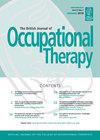Exploring the usefulness of real-time digitally supported fatigue monitoring in fatigue management: Perspectives from occupational therapists and brain injury survivors
IF 1.3
4区 医学
Q3 REHABILITATION
引用次数: 0
Abstract
Introduction:Persistent fatigue after acquired brain injury (ABI) needs long-term self-management. Self-monitoring supports self-management and informs the use of fatigue management strategies. Using ecological momentary assessment to monitor fatigue offers a data-driven approach to managing fatigue.Aims:To explore the usefulness of self-monitoring fatigue in real-time, using ecological momentary assessment to support self-management, from the perspective of people with ABI and occupational therapists.Methods:People with ABI monitoried their fatigue by wearing a Fitbit and completing six surveys a day on their phone for 6 days. Think aloud and semi-structured interviews elicited views on self-monitoring and the data generated. Transcripts were analysed using reflexive thematic analysis.Results:Four themes were developed from people with ABI ( n = 9): (1) Attending to experience, (2) making sense of data, (3) the relationship between fatigue and activity, (4) implications for daily life. Three themes from occupational therapists ( n = 5): (1) Challenges of using of data, (2) perceived benefits of self-monitoring, (3) viewing data in relation to their understanding of fatigue.Conclusion:Data generated in real-time challenged perspectives on fatigue and fatigue management. These insights may help people with ABI and their clinicians to plan personalised strategies for fatigue management and evaluate its impact on daily living.探索实时数字支持疲劳监测在疲劳管理中的实用性:职业治疗师和脑损伤幸存者的观点
导言:后天性脑损伤(ABI)后的持续疲劳需要长期的自我管理。自我监测有助于自我管理,并为疲劳管理策略的使用提供信息。目的:从后天性脑损伤患者和职业治疗师的角度出发,探讨利用生态瞬间评估对疲劳进行实时自我监测以支持自我管理的实用性。方法:后天性脑损伤患者通过佩戴Fitbit监测自己的疲劳情况,并在6天内每天在手机上完成6次调查。通过大声思考和半结构化访谈,了解他们对自我监测和所生成数据的看法。结果:ABI 患者(9 人)提出了四个主题:(1) 关注体验,(2) 理解数据,(3) 疲劳与活动之间的关系,(4) 对日常生活的影响。职业治疗师(5 人)提出了三个主题:(结论:实时生成的数据对疲劳和疲劳管理的观点提出了挑战。这些见解可能会帮助有全身性残疾的患者及其临床医生制定个性化的疲劳管理策略,并评估其对日常生活的影响。
本文章由计算机程序翻译,如有差异,请以英文原文为准。
求助全文
约1分钟内获得全文
求助全文
来源期刊

British Journal of Occupational Therapy
REHABILITATION-
CiteScore
2.20
自引率
15.40%
发文量
81
审稿时长
6-12 weeks
期刊介绍:
British Journal of Occupational Therapy (BJOT) is the official journal of the Royal College of Occupational Therapists. Its purpose is to publish articles with international relevance that advance knowledge in research, practice, education, and management in occupational therapy. It is a monthly peer reviewed publication that disseminates evidence on the effectiveness, benefit, and value of occupational therapy so that occupational therapists, service users, and key stakeholders can make informed decisions. BJOT publishes research articles, reviews, practice analyses, opinion pieces, editorials, letters to the editor and book reviews. It also regularly publishes special issues on topics relevant to occupational therapy.
 求助内容:
求助内容: 应助结果提醒方式:
应助结果提醒方式:


